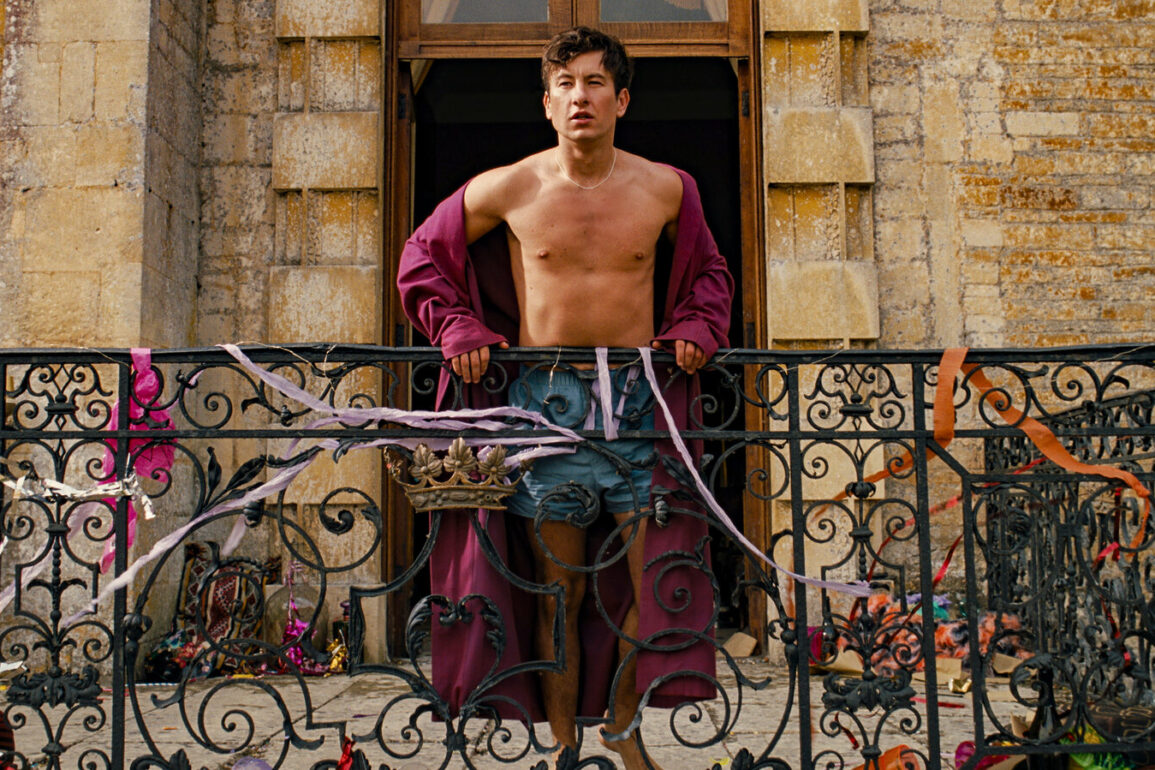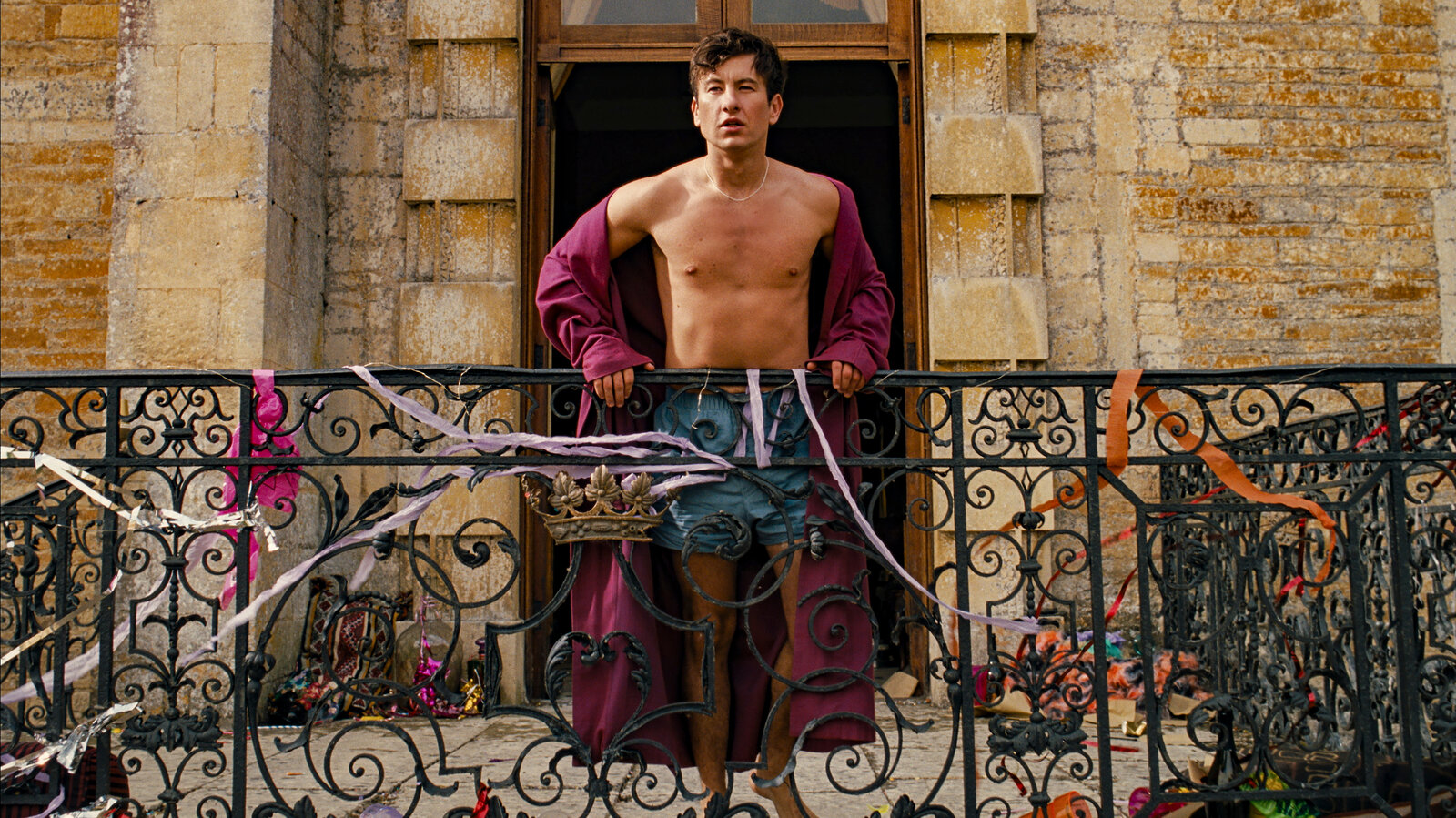In that no man’s land of stuck time that is the endless week between Christmas and New Year’s day, the streaming services have realised a few years ago that that’s when you release something you want everyone to watch and talk about. Notice I’ve not used the verb “like”.
It was the case for Bridgerton‘s debut, for Emily in Paris… and this year Amazon genuinely thought that giving us the wet dream of the upper class would have worked beyond the circlejerk of people rich enough to actually try and make themselves the victims of class war.
Yes, really.
And to try its best it began serving us Saltburn in a trailer that, to all intents and purposes, suggested heavily that what we were about to watch was a story of queer, forbidden love. Maybe unrequited love, but the quintessential Queerbaiting, which begs the question, ‘Are queer people really the best target audience to trick into spending two hours watching this film?’
In Saltburn we see poor distraught Oliver, who got into Oxford on a scholarship and whose lack of fortunes seemingly turn him into the protégé, or better, pet project, of more popular, more rich, more everything Felix. His coy and coquettish demeanour, his down to earth personality, seeming to know and accept his place in the hierarchy of the Oxford alumni, but ever so slightly, and only occasionally, revealing his true brilliance at the perfect moment for his betters to notice, catches the attention of Felix who takes a special interest, who strokes his own ego with a feather from the very wing he uses to shelter Oliver from the hardships of his life. Oliver is brought to the family home, and we the audience are distracted from his deceptions by the thousand lies the residents of the Saltburn estate tell themselves and each other. There are delusions of grandeur, open secrets that can only be spoken of in hushed tones, and a general undercurrent of unease and horror. And as we begin to see Oliver come out of his shell, and his true nature is revealed, who can blame him for the things he does in such a twisted environment?
For most of the film, the subtle message is that all the things and lies Oliver say to make himself look more miserable than his actual middle class background make him, are all innocent ones in the name of forbidden love. The strong implication is that Oliver is in love with Felix and unless you’re a reactionary homophobic boomer, how would you not sympathise with that? Except eventually the web of lies Oliver made up starts to crack when Felix, rich aristocratic good friend that he is, goes behind Oliver’s back to find his family (allegedly drug addict mother, whilst his father death just before summer recess is what gets him invited to spend the holidays at Saltburn, the seat of Felix’s father peerage) and lo and behold: Oliver is not half as miserable as he claimed to be, and you need to focus on that and that alone. Not the complete disrespect and lack of consent Felix comes from in not only finding, but forcing Oliver to go to his family despite him saying “no”, despite him asking to see his family alone. No, Oliver has become the pet project of Felix and a pet needs to be grateful, not have ideas of his own.
When they are driving back to Saltburn, Felix begins his full throttle rejection. It reminds me a lot of Nosedive, the Black Mirror episode where Naomi (Alice Eve) is at the top of popularity and food chain, and invites Lacie (Bryce Dallas Howard) to her wedding as maid of honour, because she’s just low enough but good willing enough to make Naomi look generous and charitable by inviting her lower status friend. But when Lacie becomes a bit too real she gets promptly uninvited, no matter how much of her own life she put at stake to be there at Naomi’s wedding.
Oliver’s middle class family makes him a pointless charity case in the eyes of Felix, not quite low enough, not quite in actual need but needy enough to not qualify for any Brownie Point Felix might get from society by “caring for the more unfortunate ones”.
Is that what starts the seemingly blind yet calculated rage that one by one kills the members of Felix family, starting with him?
The morning after fighting with Oliver, Felix is found dead in the maze of Saltburn. Oliver is devastated and Emerald Fennel goes for one of those visually unique car crashes you cannot stop looking at, with Oliver supposedly so distraught in front of Felix’s freshly buried coffin that he cries until he takes his clothes off and masturbate on the grave / soil, supposedly in search of a connection still with Felix?
But that’s just the beginning.
Besides the completely unemotional way Felix’s family reacts to his passing (what do you mean you don’t feel like breakfast on the morning we found the corpse of our kin in the garden? Breakfast is served and you will eat!) They are still the damaged ones. Yet the concession Emerald makes is that yes, rich people might not know how to properly address and express emotions, and Felix’s sister might make the odd snarky remark at how Oliver has no apparent right to feel so much the loss of her brother because he only knew him for six months. Yeah she’s being kind of horrible with her words, she’s picking at a supposedly fresh wound for an Oliver we still are believing at this point was in love with Felix. But really? Is being snarky such a crime?
Certainly not compared to the strong implication now that, to pay for that remark, Oliver killed her (too?) and makes it look like suicide and now the proletarians are not just ungrateful, but dangerous!
Becoming subtly aware of this, Felix’s Father, Lord of the Manor, decided to solve the problem the way rich people do: throwing money at it. Oliver is paid a large sum of money to leave Saltburn and Felix’s family behind.
When years later Oliver supposedly “bumps” into the model-turned-aristocrat mother of Felix, Elspeth, it’s as if she’s needy of all the memories Oliver represents because of course the only joke conceded at the expense of the aristocracy that Emerald gifts us with is a supposedly clever mention of ‘Common People’ and how Elspeth was confused about the idea people repeatedly had that she was the inspiration for it, but how could she be. She wasn’t Greek nor she had a thirst for knowledge but again with the original theme of “poor naive upper class” she is oh-so-fascinated by those common people, much like the girl in Jarvis’ song.
Casually, she quickly has an accident and ends up on a respirator and from here, if suspicion was still just not clear enough, we go back to see the exact, calculated way in which Oliver killed all the aristocrats one by one, calculated to the point his first encounter with Felix was manipulated to happen by him.
I think to understand Saltburn we really need to talk about its writer and director, Emerald Fennel.
Emerald is the daughter of a jewellery designer and author (get it? Emerald?), sent to private schools since… forever, and of course at Oxford, which I guess is the only merit one could ascribe to Saltburn. At least she definitely wrote about what she knows, Vis-à-vis the disgust the upper class has for anyone who’s not in it by birth and the need to make their disgust justified beyond money and access to anything they could ever want, so of course what’s better than depicting the aforementioned wet dream to invalidate the need for equality in the world? See, those pesky little low born? When they say “eat the rich” they really just want to take it from us and be rich instead! It’s not about equality at all, they just want to be us! And at least we are chosen to be here!”
There is actually a lecture that was presented at Gresham College in 1984 where the argument for monarchy and aristocracy was indeed that, by being born high they are taught how to rule and govern from birth. They truly believe that they are meant to tell us what to do whilst knowing nothing of the issues the average person goes through in life. Sounds familiar, Prime Minister Sunak?
But let’s not get derailed from Emerald. This is just to say: don’t we know that game? Insidious enough to just saw the seed of doubt? “But what if all these proletarians just want our riches for themselves? See? That will make them even somewhat worse than us who were entitled to it!”
Emerald is not new to this kind of thing; the delicious image of perversion and hatred for fellow human beings won her an Oscar for A Promising Woman, she just must be a genius and the most promising writer / director and actress in the current generation of British young bright things right?
She is also the quintessential reason why organisations like Arts Emergency have to exist, because the arts world, including the media, has a bizarre overpopulation coming from the upper classes and if part of it comes from the fact that rich people know rich people, even in other industries, and so an author and jewellery maker certainly had a friend or two in the media to introduce their little precious gem to, there’s the crucial issue that’s rarely talked about in media of how any job, any internship, any education program to access the world of the arts and media really has an unwritten rule to it, allegedly presented by the “infallible” law of supply and demand: because those are considered prestigious jobs only those who can compromise and offer the best deal will get their foot in the door, meaning that if you have 10 potential interns from the upper class who can afford to “work for experience” aka work for nothing while mummy and daddy foot the bills (if not give them one of their many flats outright), and 100 from the working class who have the pesky habit of paying for things such as food and rent as they don’t have their back covered, you can guess who’s going to get their foot in.
Now this is were the wet dream loses any sense of reality if any was left. Oliver is a special kind of serial killer, devoted only to make the aristocracy pay, not for any higher reasons or class war mind, just because he’s supposedly resentful he wasn’t “as well born” and so he “eats the rich” to become them which it’s the only way I guess the upper class can claim their life of privilege is still worth existing for them if it wouldn’t be dismantled but just appropriated by others (less valuable than them by birth or inheritance).
And on matters of inheritance, Emerald is now telling us a little nice fairytale that, given her upbringing, I’m pretty positive she knows is factually, legally wrong, but a) she thinks us peasants will hardly know the peerage law and b) acquirement, not destruction of the wealth is her point against the lower classes represented by Oliver.
Oliver kills Elspeth once he’s been put in her will as the sole heir of everything, Including Saltburn.
The last scene with him dancing naked room to room to ‘Murder on the Dance Floor‘ is supposed to be his triumph and our disgust for someone so inhumane in the process of getting all that he wanted: riches.
Here’s a crash course on why that is actually legally impossible in the UK, but wouldn’t have delivered as well to the story Emerald wanted to portray: according to peerage law, the law that since around 1066 established who is born well and high and who isn’t, carried along with the title is a “fee tail” whereas certain land and properties are not attached to a person but to a title. Titles are hereditary by blood, ‘Heirs of the Body’, meaning you can’t just decide to leave it to your friend. Which in this case means that when Felix’s father passed, not even Elspeth would have inherited Saltburn, it would have passed on to the nearest male relative of the blood of her husband as part of the Peerage (remember the entire premise of Downton Abbey? Here it is). That would of course also mean that, even if Elspeth by a loophole (say it’s a Barony title which is the only ones that could pass to a woman) would have gotten Saltburn to her name, she could not have transferred it by a simple will to Oliver.
But why caring about actual peer law, that exists to safeguard Aristocracy exactly from these kind of “usurpers”, when making up Oliver as the killer from the lower classes is so much more enticing and drives home a much better, much more subtle feeling of uneasiness, which have made this film the talk of the (globalised) town since last month?
As a final note let me address, as a queer person, the supposed appreciation we should have a for a film that “depicts queer love through the female gaze”.
It doesn’t. Here’s why:
By going back at the end of the film to establish Oliver was a calculating killer since the very beginning, it becomes obvious the film portrayed the quintessential queerbaiting rather than a sad representation of queer imposed repression. At best, Oliver was queer and being such a supervillain he drags us back to the queer coding of villains of old age. At worst, Emerald is telling us that if someone is ill intentioned enough they will play the role of a marginalised identity just to make us lower our guard before they kill us. She genuinely portrays this, in a country where the LGBTQ community and specifically the Trans community, has been accused groundlessly of this, to the point New Zealand had to recently accept an asylum request by a British trans person to safely move there and she thinks implying a serial killer wears the mask of an LGBT person to make his victims sympathetic and therefore vulnerable to him is a thing of no repercussions within the current culture? Does she not understand how media affect the way people see the world, especially when it comes to people they have no first hand knowledge of?
Were none of the actors involved aware of the not-so-subtle subtext of this film and the insane representation it was portraying, with the risk of seeding once again hatred and doubt in every person the audience see now as different, whether by class or sexuality?
You know, there was a way to do what this film portrayed itself to be, whilst the message ended up being “beware of the lower classes, they just want to take what’s rightfully yours” which begs as always the question of “why are you so afraid of the roles being reversed? Are you treating marginalised people so badly that you worry about that?”
And besides that rhetorical question, if you’ve been left with a sour taste in your mouth but can’t quite pinpoint why when you expect a queer romance, it’s not just the bathwater.
‘Big Boys’ by Jack Rooke might give you back some of that queer hope you completely lost to the altar of the upper class in Saltburn. The most common feeling I’ve seen thrown around about this film is confusion, at worst direct misinterpretation: because it features a sense of critique and the upper class, many quick reviews try to claim that’s what it is, when the evil serial killer is the outsider, the true evil beyond the snarky comments that the aristocracy throws around at most. The subtle critique is to everything the upper class imagines the working class to be about: greedy, resentful, and really not as in dire conditions as they claim to legitimise a class war, since Oliver’s life is discovered to be middle class rather than working class, with a big house and well off enough parents, as the upper class knowledge of the proletariat is only through the pages of the right wing rags and poverty porn like benefits street that have told them poverty does not exist, poverty is a choice.
If you had this uneasy feeling that you couldn’t quite put your finger on, that is why; you’ve been lured in with false promises of queer representation and understanding when all Emerald meant to do is to remind you how unworthy you are, as a queer person, as a non-upper class person, and how really your marginalisation doesn’t exist. You only make yourselves miserable in the hope of catching the benevolent charity of those born better. Until you can get a chance to kill them and wear their lives in absence of their literal skin.





